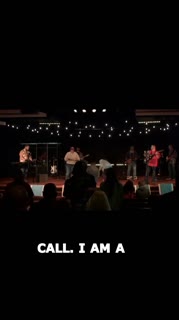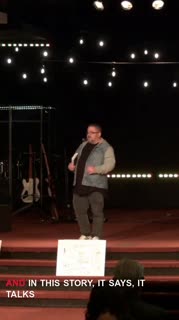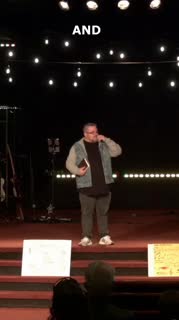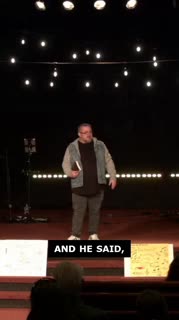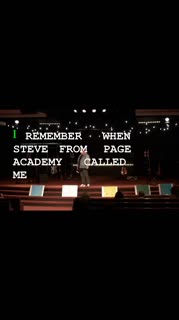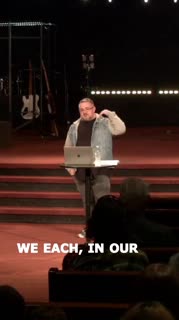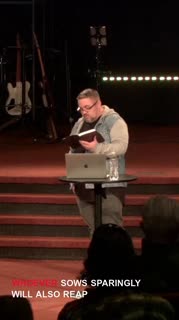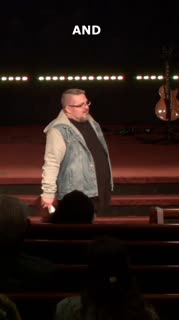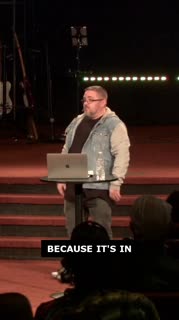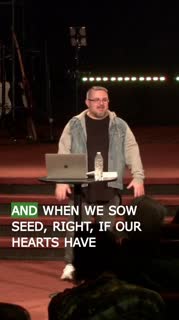Embracing Uniqueness and Generosity in Community Service
Summary
In today's message, we explored the parable of the fig tree in the vineyard, a story that has been familiar to many of us for years. This parable, found in Luke 13, challenges us to consider why a fig tree, which is not typically found in a vineyard, was planted there. This question led to a deeper reflection on the uniqueness and purpose that God has for each of us and our church. Just as the fig tree was intentionally placed in the vineyard, we are called to embrace our distinctiveness and fulfill the unique role God has for us in our community.
Our church, Harvest Church in Sand Springs, Oklahoma, is not meant to be a carbon copy of other churches. We are called to be different, to serve our community in ways that align with our unique calling. This is evident in our commitment to local missions, such as volunteering at Anderson's fall carnival, where our presence made a significant impact. Our goal is to be the fig tree in the vineyard of Sand Springs, contributing to the community in meaningful ways without overshadowing others' efforts.
We also discussed the importance of generosity, not just in financial terms but in how we invest our time and talents. Generosity is a core value that we live out by giving our time to strengthen relationships, using our talents to create opportunities, and sowing our financial resources to reap blessings. The Apostle Paul reminds us in 2 Corinthians 9 that sowing generously leads to reaping generously, and this principle applies to all areas of our lives.
As we prepare for our upcoming Friendsgiving service and Legacy Sunday, we are encouraged to pray about how we can contribute to the church's mission. This includes inviting friends and family to our Christmas at Harvest service, where we aim to share the love of Christ with those who may not yet know Him.
Key Takeaways:
1. Embrace Your Uniqueness: Just as the fig tree was uniquely placed in the vineyard, God has a distinct purpose for each of us. We are called to embrace our differences and fulfill the unique role God has for us in our community. This means not conforming to the expectations of others but being true to who God created us to be. [32:37]
2. Generosity Beyond Finances: Generosity is not limited to financial giving. It includes investing our time and talents to strengthen relationships and create opportunities. By living generously, we reflect God's love and open doors for greater blessings in our lives. [01:08:46]
3. Sowing and Reaping: The principle of sowing and reaping applies to all areas of life. When we sow kindness, time, or resources, we can expect to reap a harvest. This biblical concept encourages us to give cheerfully and trust God for the return. [56:03]
4. Healthy Boundaries: While generosity is important, it's crucial to maintain healthy boundaries. Overextending ourselves can lead to burnout and strained relationships. By setting boundaries, we ensure that we can give our best to God and others. [01:12:39]
5. The Power of Invitation: Inviting others to church events, like Christmas at Harvest, is a simple yet powerful way to share the gospel. By praying for and inviting those who are far from Christ, we participate in the Great Commission and help others experience God's love. [01:39:04]
Youtube Chapters:
- [00:00] - Welcome
- [32:37] - The Fig Tree in the Vineyard
- [34:40] - Embracing Uniqueness
- [36:06] - Impact of Local Missions
- [38:50] - Legacy Lane and Community Involvement
- [41:22] - Preparing for Friendsgiving and Legacy Sunday
- [44:52] - Core Values Recap
- [48:17] - Unity and Community
- [50:10] - Change and Honor
- [51:28] - Fun and Generosity
- [52:49] - The Principle of Sowing and Reaping
- [56:03] - Generosity in Action
- [58:49] - Balancing Generosity and Boundaries
- [01:01:35] - Cheerful Giving
- [01:08:46] - Investing Time and Talent
- [01:39:04] - Invitation to Christmas at Harvest
Study Guide
Bible Study Discussion Guide
Bible Reading:
- Luke 13:6-9
- 2 Corinthians 9:6-8
---
Observation Questions:
1. In the parable of the fig tree found in Luke 13, what is unusual about the fig tree's location, and what does this signify about its purpose? [32:37]
2. How does the sermon describe the role of Harvest Church in Sand Springs, Oklahoma, in relation to the parable of the fig tree? [34:40]
3. According to 2 Corinthians 9:6-8, what is the relationship between sowing and reaping, and how does this principle apply to generosity? [52:49]
4. What examples of local missions were mentioned in the sermon, and how do they reflect the church's commitment to being a "fig tree" in the community? [36:06]
---
Interpretation Questions:
1. How does the placement of the fig tree in the vineyard challenge traditional expectations, and what might this suggest about God's purpose for individuals and churches? [32:37]
2. In what ways does the sermon suggest that Harvest Church should embrace its uniqueness, and how does this relate to the broader Christian community? [34:40]
3. How does the principle of sowing and reaping in 2 Corinthians 9:6-8 extend beyond financial giving, and what implications does this have for other areas of life? [52:49]
4. What are the potential risks of overextending oneself in acts of generosity, and how can setting healthy boundaries help maintain balance? [01:12:39]
---
Application Questions:
1. Reflect on your own uniqueness. How can you embrace and utilize your distinct gifts and talents to serve your community, much like the fig tree in the vineyard? [32:37]
2. Consider the ways you currently give your time and talents. How can you be more intentional about investing in relationships and creating opportunities for others? [01:08:46]
3. Think about a time when you sowed kindness or generosity. What was the outcome, and how did it impact your understanding of the principle of sowing and reaping? [56:03]
4. Evaluate your current commitments. Are there areas where you might be overextending yourself? What steps can you take to establish healthier boundaries? [01:12:39]
5. Identify three people in your life who are far from Christ. How can you intentionally pray for and invite them to an upcoming church event, such as Christmas at Harvest? [01:39:04]
6. How can you contribute to your church's mission in a way that aligns with your unique calling and the needs of your community? [34:40]
7. Reflect on the sermon’s emphasis on cheerful giving. How can you cultivate a heart of generosity that is not driven by compulsion but by joy and purpose? [58:49]
Devotional
Day 1: Embrace Your God-Given Distinctiveness
God has uniquely placed each of us in our communities, much like the fig tree in the vineyard. This placement is intentional, and it calls us to embrace our distinctiveness and fulfill the unique role God has for us. We are not meant to conform to the expectations of others or to be carbon copies of those around us. Instead, we are to be true to who God created us to be, serving our community in ways that align with our unique calling. This means recognizing and valuing the differences that make us who we are and using them to contribute meaningfully to the world around us. [32:37]
"For we are his workmanship, created in Christ Jesus for good works, which God prepared beforehand, that we should walk in them." (Ephesians 2:10, ESV)
Reflection: What unique qualities or talents has God given you, and how can you use them to serve your community this week?
Day 2: Generosity as a Lifestyle
Generosity extends beyond financial giving; it encompasses how we invest our time and talents to strengthen relationships and create opportunities. Living generously reflects God's love and opens doors for greater blessings in our lives. By giving of ourselves in various ways, we demonstrate a commitment to the well-being of others and the flourishing of our community. This holistic approach to generosity encourages us to be mindful of how we can contribute to the lives of those around us, not just with our resources but with our presence and skills. [01:08:46]
"Each one must give as he has decided in his heart, not reluctantly or under compulsion, for God loves a cheerful giver." (2 Corinthians 9:7, ESV)
Reflection: In what ways can you invest your time and talents this week to strengthen a relationship or create an opportunity for someone else?
Day 3: The Principle of Sowing and Reaping
The biblical principle of sowing and reaping applies to all areas of life. When we sow kindness, time, or resources, we can expect to reap a harvest. This concept encourages us to give cheerfully and trust God for the return. It reminds us that our actions have consequences and that the seeds we plant today will bear fruit in the future. By living with this mindset, we are motivated to act with intention and purpose, knowing that our efforts will yield results in due time. [56:03]
"Do not be deceived: God is not mocked, for whatever one sows, that will he also reap." (Galatians 6:7, ESV)
Reflection: What is one area of your life where you can begin sowing positive seeds today, and what steps will you take to start this process?
Day 4: Balancing Generosity with Healthy Boundaries
While generosity is important, maintaining healthy boundaries is crucial to prevent burnout and strained relationships. By setting boundaries, we ensure that we can give our best to God and others. This balance allows us to serve effectively without depleting our own resources or neglecting our well-being. It is essential to recognize our limits and to prioritize self-care so that we can continue to be a blessing to those around us. [01:12:39]
"And let us not grow weary of doing good, for in due season we will reap, if we do not give up." (Galatians 6:9, ESV)
Reflection: Are there areas in your life where you need to establish healthier boundaries to maintain your well-being while serving others?
Day 5: The Power of Invitation
Inviting others to church events is a simple yet powerful way to share the gospel. By praying for and inviting those who are far from Christ, we participate in the Great Commission and help others experience God's love. This act of invitation is not just about filling seats but about extending an opportunity for others to encounter the transformative power of Christ. It is a tangible expression of our faith and a demonstration of our desire to see others come to know the love and grace of God. [01:39:04]
"Go therefore and make disciples of all nations, baptizing them in the name of the Father and of the Son and of the Holy Spirit." (Matthew 28:19, ESV)
Reflection: Who is one person you can invite to a church event this week, and how will you approach them with this invitation?
Quotes
I hear you call. I am a faithful, I hear you call. [00:30:30] (9 seconds)
And in this story, it says, it talks about the owner of the vineyard planting a fig tree in the middle of that vineyard. And I heard that story my entire life. Man, you know, people, preachers had preached on that story. And I'd heard it my entire life, Sunday schools, sermons, lessons, all that kind of stuff. And one day when I was studying it, man, I don't know if you've ever had the Lord just kind of stop you in your tracks. And it's like... Like he asked a question. And how many of you know when God asks you a question, it's not because he lacks an answer? Right? He really is trying to get you to change your perspective on something. And I was reading that today, or not today, but one day devotionally. And all of a sudden I heard the Lord say, Why a fig tree? [00:31:27] (57 seconds)
And all of a sudden God spoke to me and he said, Do you not think when I plant your church, when your church was started, do you think I wanted something exactly the same as everything else in that same vineyard? [00:33:32] (16 seconds)
And he said, and when I put your church in your community, I didn't put it because I wanted it to look exactly the same or act exactly the same or talk exactly the same as every other church in your community. He said, I put you there because I wanted something. [00:34:40] (21 seconds)
And the whole reason I'm saying that is because I want to be different. And the whole reason I'm talking about that is because today's Legacy Lane is local missions. And one of the things that our staff, we work really hard on, is we want to make sure that we're not walking all over someone else's niche in this community. [00:35:29] (21 seconds)
I remember when Steve from Page Academy called me and he said, hey, can we sit down and talk? I had an idea, but I don't know if you're able to do it. And I was able to sit down with him, not this past year, but the year before, and I was able to look at him and go, absolutely. Let's do it. And so now for two years, I've been able to sit down every month with the staff at that school and do a leadership lunch with them just so that they can get off -site, they can have someone else speak into their staff, and they are able to have a meeting elsewhere, off -site, so that they can all focus on what they need to. And man, it's just an incredible thing. [00:38:11] (40 seconds)
We each, in our attitudes and in our actions. I thought that that was pretty pertinent with us going into election season, that we make sure that we just keep our attitudes in check. Come on, somebody. No matter what side of the aisle you are on, we all need to keep our attitudes in check. Right? And we learned that week that God expects unity from us. It's not a self -imposed thing. Like, hey, let's make sure we're all on the same page kind of thing. God actually expects His people to walk in unity. Right? However, unity is not sameness. It's not uniformity. Right? It's agreement on purpose, not pattern. [00:47:30] (47 seconds)
Whoever sows sparingly will also reap sparingly, and whoever sows generously will also reap generously. Now, there's been a lot of talk in recent years because of the excesses of the prosperity gospel and the prosperity movement that the idea of sowing and reaping really needs to go by the wayside because it's no longer relevant and it's not their words. It's not really a biblical concept. I would completely disagree with that because the Apostle Paul is talking about a financial gift that he is getting ready to take up and he actually uses the words or the terms it's translated into. What we would translate that into sow. So when he says, He who sows sparingly reaps sparingly. He who sows generously reaps generously. He is talking about a financial offering. [00:53:56] (52 seconds)
And so I'm not going to swing to the side of the pendulum that goes, well, in church, we're not going to talk about that. We're not going to. Listen, I've got so many friends that have stopped taking up offerings. They put little boxes by the back door so that if you feel compelled to give or if you desire to give or if you are of the belief system that you should give, then you can give on your way out. No, no, no, no. I believe it's still a part of our worship. And I've had people advise me, hey, you should do away with the offering portion of your service. It'll cut down on time. Sorry. I'm not cutting down on the time by taking away our opportunity to sow. [01:00:22] (37 seconds)
Because it's in our sowing that we create a lifestyle of reaping. Okay? Now, but I refuse to do this from the opposite pendulum that goes, you should get up and preach. And I've heard this. I've been told this. You should get up and preach at least a 15 -minute message on giving during offering. [01:00:52] (30 seconds)
And when we sow seed, right, if our hearts have been positioned by the tithe, when we sow seed, all we're doing is putting that in the soil to produce a harvest in our hearts. Now we're lions. [01:33:17] (20 seconds)
